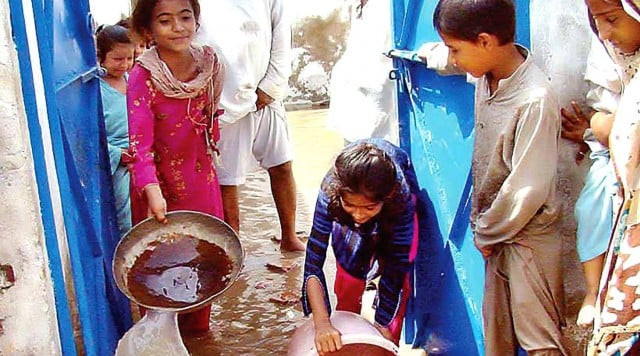Diseases put a damper on monsoon joy

According to Dr Salma Shaikh, chairperson of the paediatric unit of Liaquat University of Medical and Health Sciences (LUMHS), the body’s intestinal and digestive system becomes weak during the rainy season, which makes us highly susceptible to all kinds of infections. “So we should eat light and avoid spicy and fried food,” she recommended. She also suggested drinking warm water with meals because it helps with digestion.
While on one side the monsoon brings a pleasant change in the weather, pools of rainwater and overflowing drains cause an alarming rise in water-borne diseases.
Water-borne diseases is the general term used to refer to illnesses associated with poor water supply or dirty water, explained Dr Shaikh, adding that such diseases make up four-fifths of the illnesses in developing countries such as Pakistan.
The most common diseases in the rainy season are diarrhoea, gastroenteritis, dysentery, typhoid, cholera, and hepatitis A and E.
Rainwater collects on roads and empty plots providing more breeding grounds for mosquitoes, which spread malaria and dengue. Eye infections and flu are also quite common in the monsoons.
These diseases are not just restricted to children but can occur as frequently in adults, cautioned Dr Shaikh. She also advised diabetic patients to take special care of their feet during the rainy season.
“They should take care not to walk barefoot on soil since the dirt is a reservoir of all kinds of germs,” she warned.
People with asthmatic problems should also take extra care and ensure that their vicinity is free from stagnant pools of water because they are especially vulnerable during this season.
Dos and don’ts of the season
While the doctor listed all the diseases associated with the monsoon, she also reiterated that most of these illnesses can be easily avoided. Water extracted from deep down should not be used since it will most likely be contaminated, she said.
Also, people must refrain from self-medication, warned Dr Shaikh.
The tendency to treat infections, such as the common flu, by using self-prescribed antibiotics can very often aggravate the problem. “Use of antibiotics, according to the WHO, is not advisable for curing viral diseases because such problems vanish themselves within three to five days,” she said, adding that even doctors have a habit of prescribing unnecessary antibiotics for the treatment of such diseases.
Among the practices that households should adopt, for at least the monsoons, is the use of boiled water.
People also have to be very careful with their diets and lifestyle. Strict hygiene must be maintained, Dr Shaikh recommended.
Diseases also spread due to spoiled food, cautioned the doctor, referring to increased power outages that cause food stored in the fridge to go bad without people realising it.
People should also avoid going out unprotected in the sun, especially children.
Fluid intake should be increased during the season while overripe fruits and vegetables should be avoided. Garbage should be disposed properly, added the doctor.
Published in the Express Tribune, June 8th, 2010.



















COMMENTS
Comments are moderated and generally will be posted if they are on-topic and not abusive.
For more information, please see our Comments FAQ